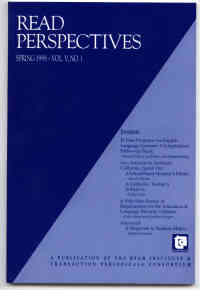
READ
|
|

The READ Institute

The Institute for Research in English Acquisition and Development
 PUBLICATIONS
PUBLICATIONS

 READ Perspectives
READ Perspectives
READ's annual publication, reviews current research studies and provides detailed descriptions of effective English language learning programs in U.S. schools. Subscriptions are available for $35 by becoming a READ member or through
Transaction Publishers
Rutgers University
(732) 445-2280
Back issues of READ Perspectives are also available at $5 each. Follow this link for a complete list of all Back Issues and articles.

 Forked Tongue: The Politics of Bilingual Education.
Forked Tongue: The Politics of Bilingual Education.
By Rosalie Porter.
Second Edition can be ordered through Transaction Publishers. ($30)
First Edition is available directly from READ for $10.
 TEACHING ENGLISH WINS:
TEACHING ENGLISH WINS:
AN ANALYSIS OF CALIFORNIA TEST SCORES AFTER PROPOSITION 227
Despite all of the rhetoric decrying how California's non-English-speaking students would be harmed by the new English-immersion mandate, the end result is good news. After only seven months of instruction, LEP students were not only not harmed by English immersion; they made significant gains in reading and writing in English as well as math. Not surprisingly, the greatest gains were made in school districts that chose the strictest interpretation of the initiative and implemented the most intensive English-immersion programs.
 CONFUSION AND OBFUSCATION:
THE NEW CALIFORNIA GUIDELINES FOR PROPOSITION 227
CONFUSION AND OBFUSCATION:
THE NEW CALIFORNIA GUIDELINES FOR PROPOSITION 227
In August 1999, more than a year after voters approved Proposition 227, the California Department of Education (CDE) finally issued its revised State Program for English Learners Coordinated Compliance Review Training Guide 2000-2001. The reason CDE officials took so long to offer school districts this guidance is obvious: they were hoping that the courts would overturn the ballot initiative. The guidelines themselves are a transparent attempt to reduce the impact of Proposition 227, which eliminated the CDE's favored bilingual education programs and replaced them with structured English immersion for language-minority students.
 From Primary Language Instruction to English Immersion:
From Primary Language Instruction to English Immersion:
How Five California Districts Made the Switch
By Kevin Clark, June 1999.
The five school districts examined in this report took the concept of immersion language teaching and turned it into a practical educational model for teaching today's Limited-English Proficient students. Readers will benefit from Mr. Clark's evaluation of the districts and his data on student achievement.
 The Future of Bilingual Education in Massachusetts: Lessons from California.
The Future of Bilingual Education in Massachusetts: Lessons from California.
by Rosalie Pedalino Porter
Originally Published by the Massachusetts Association of Teachers of English to Speakers of Other Languages. Winter 1998.
 Mystery on the Bilingual Express: A Critique of the Thomas and Collier Study.
Mystery on the Bilingual Express: A Critique of the Thomas and Collier Study.
By Christine Rossell, Ph.D.
Perhaps no other "yet to be released" report has been quoted so much or so often as the so-called "Collier Study." In 1995, approximately two years before the report was completed, Virginia Collier was holding public meetings at which she disseminated a five page summary of her "study" - two pages of text, two pages of line graphs, and a one page list of program definitions. In no time, the "Collier Study" had become another factoid in the controversy over bilingual education. Even though no one had actually read it, the report was being cited everywhere as proof that bilingual education, particularly two-way bilingual education, was superior to all other programs for Limited-English Proficient (LEP) children.
 A 50 State Survey of Requirements for the Education of Language Minority Children
A 50 State Survey of Requirements for the Education of Language Minority Children
This report was produced by the Center for Equal Opportunity and published by the READ Institute. The report briefly outlines each states laws and requirements. One finding was that only eleven states mandate bilingual education programs.
 Federal Control Out Of Control:
Federal Control Out Of Control:
The Office for Civil Rights' Hidden Policies on Bilingual Education
This report examines OCR's current policies and practices for determining whether school systems are providing appropriate educational services to national-origin minority students who are English language learners. The information in this report is taken from OCR documents in the public domain, including approximately 160 compliance letters OCR sent to school systems in 1996 and 1997.
 Basics of Structured English Immersion for Language-Minority Students
Basics of Structured English Immersion for Language-Minority Students
This article contains information on implementing a Strucured English Immerision program as required by Proposition 227 in California for language-minority children. This guide is for informational purposes only.
 Bilingual Education: A Ten State Report Card
Bilingual Education: A Ten State Report Card
This policy brief discusses the bilingual education laws of the ten states with the most language-minority students in detail. The brief also grades the laws of the different states and offers policy suggestions regarding the education of language-minority children.
 The Importance of Learning English.
The Importance of Learning English.
A new national poll of Hispanic parents on education issues. We polled 600 Hispanic parents in English and Spanish on how they wanted their children educated. 63 percent wanted their kids to learn English as soon as possible, 81 percent wanted their children taught in English if it meant more time spent learning English, and parents overwhelmingly ranked learning English as their number one concern.
 The Self-Esteem Fraud: Why Feel Good Education Does Not Lead To Academic Success.
The Self-Esteem Fraud: Why Feel Good Education Does Not Lead To Academic Success.
This policy brief discusses the lack of evidence that high self-esteem leads to high achievement and that the promotion of self-esteem may actually cause an increase in violence. Educators are particularly eager to promote self-esteem among minority students and may in fact be causing considerable harm.
 National Academy of Sciences Report on Bilingual Education
National Academy of Sciences Report on Bilingual Education
This report by Prof. Charles Glenn summarizes the key findings of the National Research Council's report, Improving Schooling for Language-Minority Children: A Research Agenda. The NRC found that based on all of the available evidence they could not determine if children were being helped or harmed by bilingual education versus alternative programs.
 The Case Against Bilingual Education
The Case Against Bilingual Education
Reprinted from the May 1998, Atlantic Monthly
Bilingual education is a classic example of an experiment that was begun with
the best of humanitarian intentions but has turned out to be terribly
wrongheaded. To understand this experiment, we need to look back to the
mid-1960s, when the civil-rights movement for African-Americans was at its
height and Latino activists began to protest the damaging circumstances that
led to unacceptably high proportions of school dropouts among Spanish-speaking
children -- more than 50 percent nationwide.
 Bilingual Immersion: A Longitudinal Evaluation of the El Paso Program.
Bilingual Immersion: A Longitudinal Evaluation of the El Paso Program.
By Russell Gersten, John Woodward and Susan Schneider, READ Institute (1992).
The El Paso follow-up study is available in READ Perspectives V-1 (1998).
 The Cost of Bilingual Education in the United States, 1991-92.
The Cost of Bilingual Education in the United States, 1991-92.
American Legislative Exchange Council and U.S. English (1994).
 Out of the Barrio: Toward a New Politics of Hispanic Assimilation.
Out of the Barrio: Toward a New Politics of Hispanic Assimilation.
By Linda Chavez.
This controversial book shatters the myth that the more than twenty million Hispanics in the United States are a permanent underclass. Linda Chavez tells the largely untold story of Hispanic progress and achievement and considers the radical implications for bilingual education, immigration, and affirmative action.
 Improving Schooling For Language -Minority Children: A Research Agenda.
Improving Schooling For Language -Minority Children: A Research Agenda.
Diane August and Kenji Hakuta, Editors. Produced by the National Research Council of the National Academy of Sciences.
 Learning in Two Languages : From Conflict to Consensus in the Reorganization of Schools.
Learning in Two Languages : From Conflict to Consensus in the Reorganization of Schools.
by Gary Imhoff.
Reprints, studies and back copies of READ publications may be ordered for $5 each from:
The READ Institute
815 15th Street, NW
Suite 930
Washington, DC 20005
Main (202) 639-0803
Fax (202) 639-0827

Also visit the Center for Equal Opportunity.


 PUBLICATIONS
PUBLICATIONS
 Bilingual Education News
Bilingual Education News

 READ Perspectives
READ Perspectives
 Forked Tongue: The Politics of Bilingual Education.
Forked Tongue: The Politics of Bilingual Education. TEACHING ENGLISH WINS:
TEACHING ENGLISH WINS: CONFUSION AND OBFUSCATION:
THE NEW CALIFORNIA GUIDELINES FOR PROPOSITION 227
CONFUSION AND OBFUSCATION:
THE NEW CALIFORNIA GUIDELINES FOR PROPOSITION 227 From Primary Language Instruction to English Immersion:
From Primary Language Instruction to English Immersion: The Future of Bilingual Education in Massachusetts: Lessons from California.
The Future of Bilingual Education in Massachusetts: Lessons from California. Mystery on the Bilingual Express: A Critique of the Thomas and Collier Study.
Mystery on the Bilingual Express: A Critique of the Thomas and Collier Study. A 50 State Survey of Requirements for the Education of Language Minority Children
A 50 State Survey of Requirements for the Education of Language Minority Children Federal Control Out Of Control:
Federal Control Out Of Control: Basics of Structured English Immersion for Language-Minority Students
Basics of Structured English Immersion for Language-Minority Students Bilingual Education: A Ten State Report Card
Bilingual Education: A Ten State Report Card The Importance of Learning English.
The Importance of Learning English. The Self-Esteem Fraud: Why Feel Good Education Does Not Lead To Academic Success.
The Self-Esteem Fraud: Why Feel Good Education Does Not Lead To Academic Success. National Academy of Sciences Report on Bilingual Education
National Academy of Sciences Report on Bilingual Education The Case Against Bilingual Education
The Case Against Bilingual Education Bilingual Immersion: A Longitudinal Evaluation of the El Paso Program.
Bilingual Immersion: A Longitudinal Evaluation of the El Paso Program. The Cost of Bilingual Education in the United States, 1991-92.
The Cost of Bilingual Education in the United States, 1991-92. Out of the Barrio: Toward a New Politics of Hispanic Assimilation.
Out of the Barrio: Toward a New Politics of Hispanic Assimilation. Improving Schooling For Language -Minority Children: A Research Agenda.
Improving Schooling For Language -Minority Children: A Research Agenda. Learning in Two Languages : From Conflict to Consensus in the Reorganization of Schools.
Learning in Two Languages : From Conflict to Consensus in the Reorganization of Schools.


